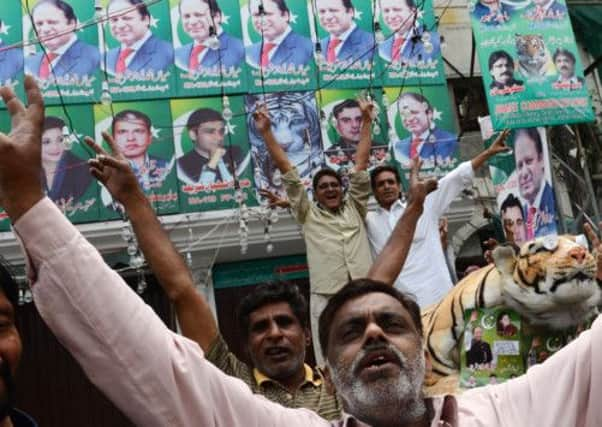Pakistan election: Sharif makes triumphant comeback


Polling tallies put Mr Sharif close to the majority needed to govern outright. Even if he falls short of that threshold, independent candidates almost certain to swing to his favour would give his Pakistan Muslim League-N a ruling majority.
The margin of victory over the closest competitors – a party headed by former cricket star Imran Khan and the outgoing Pakistan People’s Party – gave steel magnate Mr Sharif’s party a clear mandate to guide the country of 180 million over the next five years.
Advertisement
Hide AdAdvertisement
Hide AdMr Khan put up a strong fight and he is likely to remain a force in Pakistani politics, possibly becoming the main opposition figure. The PPP, which led the government for the last five years, has done badly and could come in third place.
Television channels said of the results declared by yesterday evening, Mr Sharif’s PML-N had captured 94 of the 272 contested National Assembly seats.
Based on trends, it was likely to get around 130, and should easily be able to make up the required majority of 137 with support from independents and small parties.
Mr Khan’s Tehrik-i-Insaf (PTI) has secured 21 seats while the PPP won 19.
The elections, held on Saturday, were marred by a campaign by Islamic fundamentalists to block the voting. Despite pre-poll violence and attacks that killed at least 40 people, voter turnout was a robust 60 per cent.
Once it establishes a majority, Mr Sharif’s party would be allocated a majority of 70 other parliamentary seats that are reserved for women and non-Muslim minorities.
Mr Sharif has waited patiently to rule Pakistan again. As the main opposition leader, he avoided undermining the PPP when it was in trouble, and analysts describe him as more cautious than when he was prime minister twice in the 1990s.
“Seemingly a genuinely changed man from his troubling stints as prime minister in the 90s, Sharif now appears to have both a genuine mandate as well as a grasp of the direction Pakistan needs to be steered in,” said political analyst Cyril Almeida.
Advertisement
Hide AdAdvertisement
Hide AdIn one sense, the polls were a democratic landmark, marking the first time one elected government was to replace another in a country vulnerable to military takeovers.
But Saturday’s vote failed to realise the hopes of many that the hold of patronage-based parties would end after years of misrule and corruption.
Mr Sharif, 63, is almost certain to become prime minister for a third time. The religious conservative has said the army, which has ruled the country for more than half of its history, should stay out of politics.
But he will have to work with Pakistan’s generals, who set foreign and security policy and will manage the country’s thorny relationship with the US.
Mr Sharif also believes Pakistan should reconsider its support for the US war on Islamist militancy, which has earned the country billions of dollars in aid.
But his main job will be to ease widespread discontent over the Taleban insurgency, endemic corruption, chronic power cuts and crumbling infrastructure. He has described Pakistan as a “mess” and said the key to recovery is speedy growth.
Mr Sharif will likely press for negotiation with the Pakistan wing of the Taleban, whose bombing attacks failed to derail the election, but he could run into resistance from the military which has lost thousands of soldiers fighting the insurgency.
In the end, cricketing hero Khan did not have the momentum needed to trip up Sharif despite his popularity among urban youths.